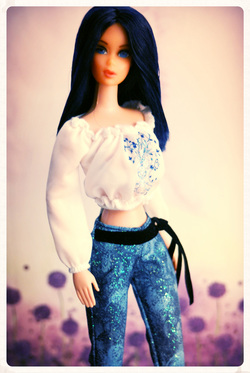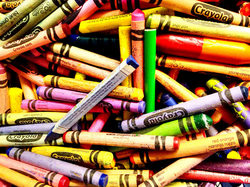It may be comfortable for a writer to tackle one genre in so far that he may master it, that it may become normal for him to write in that genre, but that writer will be stuck writing the same piece over and over. The writers who notice they are writing with their normal, unchallenged practices and make an effort to entertain more possibilities have the potential to create meaningful and original works. Often, genre heavy pieces feel lost, as though they are missing something important. When I was a child, I played with Hot Wheels given to me as Christmas presents that weren’t aligned with my lists to Santa. My interest in plastic wheels and artificial chrome was not as strong as my interest in plastic legs and synthetic hair. And yet, when I traveled to my sister’s room to play with Barbies, I was turned away. When I was denied exploring barbie playing, I was limited to hot wheel playing. I could only adhere to the genre hot wheel playing and so I felt like I was missing something. There was an exploration I was denied and thus, who I was as a person and a writer was limited. There are many writers who needlessly limit themselves. Many feel as though their interests aren’t what audiences want to hear about and never explore them. Other writers do not explore an idea because it is too weird and are fearful of what others would think of them if they were to produce writing with such a strange theme. These writers will not make lasting impressions, but more importantly, they will not further themselves and their capabilities. They will continue to do they same work over and over again, trapped in a genre. I have experienced this captivity in my youth. I tried very hard to be a boy, adhering to its conventions including video game playing, collecting cards, looking at women as they passed by. My captivity in that genre limited explorations I was interested in. I often felt like I was missing something as a child, like I didn’t know who I was; a broken winged bird wobbling about, staring at all the other crows sitting together on telephone wires. I desperately needed to change my genre practices, to disrupt the normal way of being a boy. When I began my explorations, I started living life, gaining new ways to appreciate myself and new ways to express who I am. This was possible by struggling with new genres, trying on unfamiliar conventions that I was not able to react to and learning new truths in the process. Living and writing within a genre one isn’t familiar with forces writers to work on projects without the ability to rely on conventions they have already mastered. When writers work on projects outside their comfort zone, they are faced with decisions they have never considered before. The decision making skills that develop when you write in unfamiliar ways adds to your repertoire of methods and styles of writing.
It wasn’t until high school when I finally broke free from my normal genre adherences, when I finally wrote my life in a genre other than boy. I was in New York city very late at night, breaking the conventions of being a good child, a good boy. Following a friend into the back entrance of a night club I was asked to perform. “He’ll do it. He’s a performer,” my friend authored. And I nodded, agreeing to and entertaining his writing of who I was. I stepped into this new identity, allowing men in heels and high hair beat my face until I was able to write in the genre of woman. The experience was enlightening. Swaying hips, flipped wrists, twirling about and flirting— I was no longer boy, for I was not adhering to the conventions associated. Instead, I was writing my life, performing my new identity as drag queen.
Bland writers do not dress up their work in drag. They fail to write in practices across mediums and genres. Instead, they normalize writing, normalize text. Writing is treated as stagnant, as an unchanging truth; but active engagement could promote further exploration of not only style but of life and its meanings and truths. Engagement in challenging the normal has the potential to create new styles, voices, and interests in our writing. Coat your writing in makeup, set it in heels, and strap onto it a large wig. Dress your writing in drag, in what is not normal and just like a drag queen, you will be able to stimulate your audiences.
0 Comments
Leave a Reply. |
Archives
April 2024
Categories
All
|
|
Glassworks is a publication of Rowan University's Master of Arts in Writing 260 Victoria Street • Glassboro, New Jersey 08028 glassworksmagazine@rowan.edu |
All Content on this Site (c) 2024 Glassworks
|




 RSS Feed
RSS Feed
